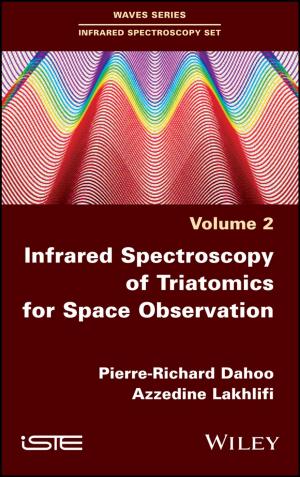Enabling Technologies for High Spectral-efficiency Coherent Optical Communication Networks
Nonfiction, Science & Nature, Science, Physics, Waves & Wave Mechanics| Author: | Xiang Zhou, Chongjin Xie | ISBN: | 9781119078258 |
| Publisher: | Wiley | Publication: | April 29, 2016 |
| Imprint: | Wiley | Language: | English |
| Author: | Xiang Zhou, Chongjin Xie |
| ISBN: | 9781119078258 |
| Publisher: | Wiley |
| Publication: | April 29, 2016 |
| Imprint: | Wiley |
| Language: | English |
Presents the technological advancements that enable high spectral-efficiency and high-capacity fiber-optic communication systems and networks
This book examines key technology advances in high spectral-efficiency fiber-optic communication systems and networks, enabled by the use of coherent detection and digital signal processing (DSP). The first of this book’s 16 chapters is a detailed introduction. Chapter 2 reviews the modulation formats, while Chapter 3 focuses on detection and error correction technologies for coherent optical communication systems. Chapters 4 and 5 are devoted to Nyquist-WDM and orthogonal frequency-division multiplexing (OFDM). In chapter 6, polarization and nonlinear impairments in coherent optical communication systems are discussed. The fiber nonlinear effects in a non-dispersion-managed system are covered in chapter 7. Chapter 8 describes linear impairment equalization and Chapter 9 discusses various nonlinear mitigation techniques. Signal synchronization is covered in Chapters 10 and 11. Chapter 12 describes the main constraints put on the DSP algorithms by the hardware structure. Chapter 13 addresses the fundamental concepts and recent progress of photonic integration. Optical performance monitoring and elastic optical network technology are the subjects of Chapters 14 and 15. Finally, Chapter 16 discusses spatial-division multiplexing and MIMO processing technology, a potential solution to solve the capacity limit of single-mode fibers.
• Contains basic theories and up-to-date technology advancements in each chapter
• Describes how capacity-approaching coding schemes based on low-density parity check (LDPC) and spatially coupled LDPC codes can be constructed by combining iterative demodulation and decoding
• Demonstrates that fiber nonlinearities can be accurately described by some analytical models, such as GN-EGN model
• Presents impairment equalization and mitigation techniques
Enabling Technologies for High Spectral-efficiency Coherent Optical Communication Networks is a reference for researchers, engineers, and graduate students.
Xiang Zhou is a Tech Lead within Google Platform Advanced Technology. Before joining Google, he was with AT&T Labs, conducting research on various aspects of optical transmission and photonics networking technologies. Dr. Zhou is an OSA fellow and an associate editor for Optics Express. He has extensive publications in the field of optical communications.
Chongjin Xie is a senior director at Ali Infrastructure Service, Alibaba Group. Before joining Alibaba Group, he was a Distinguished Member of Technical Staff at Bell Labs, Alcatel-Lucent. Dr. Xie is a fellow of OSA and senior member of IEEE. He is an associate editor of the Journal of Lightwave Technology and has served in various conference committees.
Presents the technological advancements that enable high spectral-efficiency and high-capacity fiber-optic communication systems and networks
This book examines key technology advances in high spectral-efficiency fiber-optic communication systems and networks, enabled by the use of coherent detection and digital signal processing (DSP). The first of this book’s 16 chapters is a detailed introduction. Chapter 2 reviews the modulation formats, while Chapter 3 focuses on detection and error correction technologies for coherent optical communication systems. Chapters 4 and 5 are devoted to Nyquist-WDM and orthogonal frequency-division multiplexing (OFDM). In chapter 6, polarization and nonlinear impairments in coherent optical communication systems are discussed. The fiber nonlinear effects in a non-dispersion-managed system are covered in chapter 7. Chapter 8 describes linear impairment equalization and Chapter 9 discusses various nonlinear mitigation techniques. Signal synchronization is covered in Chapters 10 and 11. Chapter 12 describes the main constraints put on the DSP algorithms by the hardware structure. Chapter 13 addresses the fundamental concepts and recent progress of photonic integration. Optical performance monitoring and elastic optical network technology are the subjects of Chapters 14 and 15. Finally, Chapter 16 discusses spatial-division multiplexing and MIMO processing technology, a potential solution to solve the capacity limit of single-mode fibers.
• Contains basic theories and up-to-date technology advancements in each chapter
• Describes how capacity-approaching coding schemes based on low-density parity check (LDPC) and spatially coupled LDPC codes can be constructed by combining iterative demodulation and decoding
• Demonstrates that fiber nonlinearities can be accurately described by some analytical models, such as GN-EGN model
• Presents impairment equalization and mitigation techniques
Enabling Technologies for High Spectral-efficiency Coherent Optical Communication Networks is a reference for researchers, engineers, and graduate students.
Xiang Zhou is a Tech Lead within Google Platform Advanced Technology. Before joining Google, he was with AT&T Labs, conducting research on various aspects of optical transmission and photonics networking technologies. Dr. Zhou is an OSA fellow and an associate editor for Optics Express. He has extensive publications in the field of optical communications.
Chongjin Xie is a senior director at Ali Infrastructure Service, Alibaba Group. Before joining Alibaba Group, he was a Distinguished Member of Technical Staff at Bell Labs, Alcatel-Lucent. Dr. Xie is a fellow of OSA and senior member of IEEE. He is an associate editor of the Journal of Lightwave Technology and has served in various conference committees.















